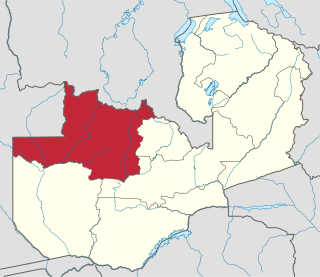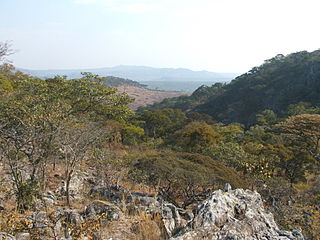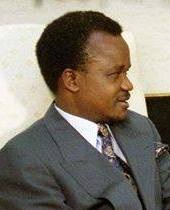 |
|---|
Mufumbwe is a constituency of the National Assembly of Zambia. [1] It covers the towns of Chizela, Kalengwa, Kangalesha and Mufumbwe in Mufumbwe District of North-Western Province.
 |
|---|
Mufumbwe is a constituency of the National Assembly of Zambia. [1] It covers the towns of Chizela, Kalengwa, Kangalesha and Mufumbwe in Mufumbwe District of North-Western Province.
Kaonde (kiiKaonde) is a Bantu language spoken primarily in Zambia but also in the Democratic Republic of the Congo. Kaonde and its dialects are spoken and understood by perhaps 350,000 people or more. It is estimated that approximately 2.3% of Zambians are native Kaonde speakers. Kaonde speakers overwhelmingly live in the Northwestern and parts of Central regions of Zambia.

Elections in Zambia take place within the framework of a multi-party democracy and a presidential system. The President and National Assembly are simultaneously elected for five-year terms.

North-Western Province is one of ten Provinces of Zambia. It covers an area of 125,826 km2 (48,582 sq mi), has a population of 1,278,357 and a population density of 20 per square kilometre as of 2021. It is the most sparsely populated province in the country. The provincial capital is Solwezi. The literacy rate stood at 63 per cent in 2010 against a national average of 70.2 per cent. The rural population constituted 77.45%, while the urban population was 22.55%. North-Western Province is bordered along Angola in the west, the Democratic Republic of Congo in the north, Copperbelt Province in the east, Central in the south-east, and Western Province in the south-west.

The National Assembly is Zambia's unicameral legislative body. Between 1972 and 1990, Zambia was a one-party state with the United National Independence Party (UNIP) as the sole legal party.

The ten provinces of Zambia are divided into a total of 116 districts as of 2018.

Chitemene, from the ciBemba word meaning “place where branches have been cut for a garden”, is a system of slash and burn agriculture practiced throughout northern Zambia. It involves coppicing or pollarding of standing trees in a primary or secondary growth Miombo woodland, stacking of the cut biomass, and eventual burning of the cut biomass in order to create a thicker layer of ash than would be possible with in situ burning. Crops such as maize, finger millet, sorghum, or cassava are then planted in the burned area.

The Speaker of the National Assembly of Zambia is a position established under Article 69(1) of the constitution. The Speaker is elected by members of the Assembly from anyone eligible to be elected to the National Assembly, but cannot be a sitting member.

General elections were held in Zambia on 19 December 1968 to elect the National Assembly and President. The first post-independence polls saw incumbent Kenneth Kaunda retain his post as president, whilst his United National Independence Party, the only party to field candidates in all 105 constituencies, won 81 of the 105 seats in the National Assembly. Voter turnout was 82.5% in the parliamentary election, but 87.1% in the presidential election.

General elections were held in Zambia on 5 December 1973. They were the first elections held since the country was formally declared a one-party state in August, with the United National Independence Party (UNIP) as the only legally permitted party. UNIP leader Kenneth Kaunda was automatically elected to a third five-year term as President, and was confirmed in office via a referendum in which 88.8% of voters approved his candidacy. UNIP also won all 125 seats in the National Assembly. Voter turnout was 39% of the 1,746,107 registered voters for the presidential election, and 33% for the National Assembly election.

General elections were held in Zambia on 31 October 1991 to elect a President and National Assembly. They were the first multi-party elections since 1968, and only the second multi-party elections since independence in 1964. The United National Independence Party (UNIP), which had led the country since independence, was comprehensively beaten by the Movement for Multi-Party Democracy (MMD). Kenneth Kaunda, who had been president since independence, was defeated in a landslide by MMD challenger Frederick Chiluba in the presidential elections, whilst the MMD won 125 of the 150 elected seats in the expanded National Assembly. Voter turnout was 45%.
Cavmont Bank Limited is a commercial bank in Zambia. It is licensed by the Bank of Zambia, the central bank and national banking regulator.

Nalolo is a constituency of the National Assembly of Zambia. It covers Nalolo District in Western Province.

Mulobezi is a constituency of the National Assembly of Zambia. It covers Mulobezi and surrounding areas in Mulobezi District of Western Province.

Mongu Central is a constituency of the National Assembly of Zambia. It covers part of Mongu District in Western Province.

Nalikwanda is a constituency of the National Assembly of Zambia. It covers part of Mongu District in Western Province.

Magoye is a constituency of the National Assembly of Zambia. It covers the village of Magoye and surrounding areas in Mazabuka District of Southern Province.

Mangango is a constituency of the National Assembly of Zambia. It covers part of Kaoma District in Western Province.

Luena is a constituency of the National Assembly of Zambia. It covers Limulunga District in Western Province, including the town of Limulunga.